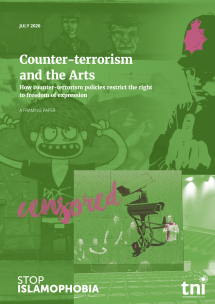Ideas into movement
Boost TNI's work
50 years. Hundreds of social struggles. Countless ideas turned into movement.
Support us as we celebrate our 50th anniversary in 2024.

Counter-terrorism and the Arts is a framing paper, aiming to set out the main concerns regarding the impact of counter-terrorism policies, legislation and national security measures on freedom of expression, specifically in relation to the arts.

Europol’s Terrorism Situation and Trend Report 2019 considers five categories of terrorism, dividing the concept into “jihadist terrorism”, “ethno-nationalist and separatist terrorism”, “left-wing and anarchist terrorism”, “right-wing terrorism” and “single-issue terrorism”. The fear of terrorism and the “increasing polarization and rise of extremist views” has seen States amend and introduce laws on combatting terrorism or protecting victims, many of which interact directly with the right to freedom of expression by introducing restrictions to acts found to glorify or encourage terrorist offences. The 2015 Joint Declaration on Freedom of Expression and Responses to Conflict Situations warned against over-broad restrictions relating to terrorism and against the vague concepts of “glorifying”, “justifying” and “encouraging” being included in definitions of terrorism-related offences in legislation.
Misuse of anti-terror legislation can threaten freedom of expression both directly, through judicial and procedural application of the law, and via the changes in individuals’ behaviour that the expectation of this can create. Laws criminalizing vaguely defined “extremist activities” or offering too wide a definition of offences “may lead to unnecessary or disproportionate restrictions on the right to freedom of expression”. Three common qualities are necessary in legislation to insure against the misuse of anti-terror legislation to restrict the right to freedom of expression:
This paper will firstly explore the contexts of freedom of expression and counter-terrorism legislation, establishing the importance of both and their development and interaction in national and international law. Then, the application of restrictions to freedom of expression under counter-terror measures will be introduced and the legitimate grounds for doing so, in general and during states of emergency, will be analysed. The case studies of laws passed in Turkey, France, Spain and the United Kingdom are then briefly used to demonstrate a cross section of approaches to the threat of terrorism across the continent, before analysing how these approaches have impacted on freedom of expression, especially in the arts, in these and other European States. Finally, the scoping paper ends with a brief synthesis of trends and impacts across Europe, suggesting further research and recommendations.